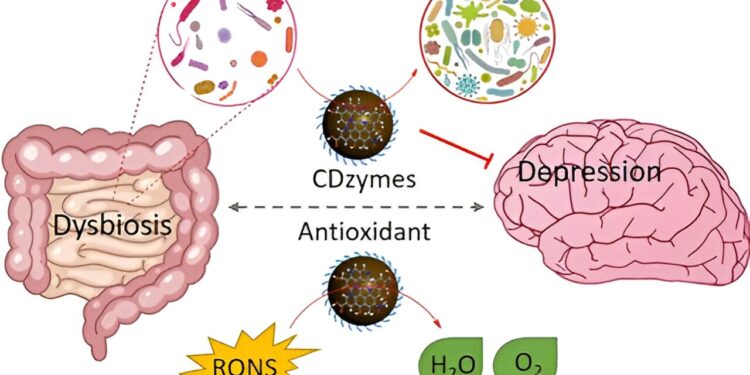Credit: Langmuir (2024). DOI: 10.1021/acs.langmuir.4c02481
Depression is a daunting challenge to diagnose and treat. Among the factors that influence the onset and severity of depression, there is growing evidence of chemical imbalances that generate oxidative stress throughout the body. To address this problem, researchers have published a paper in the journal Langmuir developed antioxidant carbon dot nanozymes (synthetic enzyme-like substances) that reduce oxidative stress, rebalance intestinal flora, and alleviate stress-induced depression in rats.
Mental health disorders such as depression not only reduce the quality of life of those affected, but also pose a challenge to public health and economic prosperity. One potential hallmark of depressive disorder is the accumulation of reactive oxygen and nitrogen-containing compounds, which can overwhelm the body’s natural defenses. The resulting oxidative stress affects gut health by disrupting the balance of microbes, which can trigger inflammation and impair brain and neuronal function.
To address this problem, Jihong Huang, Weiwei He and their colleagues synthesized enzyme-like substances with strong antioxidant capacity to reduce reactive species and thus restore the balance of the intestinal microbiota and alleviate depression.
The researchers created carbon dot nanozymes (CDzymes) by polymerizing glucose and the amino acid histidine to provide antioxidant activity while maintaining biocompatibility. The CDzymes neutralized a range of reactive species in solution and in cultured mouse nerve cells without signs of toxicity.
The researchers then used a rat model of depression known as chronic and unpredictable mild stress (CUMS). They compared the animals in four groups: healthy rats, untreated CUMS rats, and CUMS rats treated with either gamma-aminobutyric acid (GABA), an antidepressant that inhibits nerve signaling, or CDzymes.
Rats receiving either treatment displayed less depressive behavior than untreated CUMS rats in terms of reward seeking, curiosity, willingness to explore, and resistance to despair. The behavioral improvements observed with GABA or CDzymes treatment also corresponded with improved levels of several depression-related neurotransmitters isolated from brain tissue.
The researchers then studied the impact of CUMS and treatment on the rodents’ gut microbiome by analyzing fecal microbes. Although microbial richness and diversity were significantly reduced in depressed animals, this reduction was largely reversed to the same degree with GABA or CDzymes treatment.
Additionally, the types of microbes present in the feces of the treated rats were much closer to those of healthy rats, highlighting the link between gut health and mental health. This microbial restoration also led to improved metabolism of several amino acids essential for nerve signaling.
Taken together, these results show that CDzymes are as effective as GABA in animal studies, making them another potential therapeutic option for treating depressive disorder.
More information:
Huimin Jia et al, Carbon dot antioxidant nanozymes alleviate stress-induced depression by modulating gut microbiota, Langmuir (2024). DOI: 10.1021/acs.langmuir.4c02481
Provided by the American Chemical Society
Quote:Antioxidant carbon dot nanozymes alleviate depression in rats by restoring gut microbiome (2024, September 18) retrieved September 19, 2024 from
This document is subject to copyright. Apart from any fair dealing for the purpose of private study or research, no part may be reproduced without written permission. The content is provided for informational purposes only.



